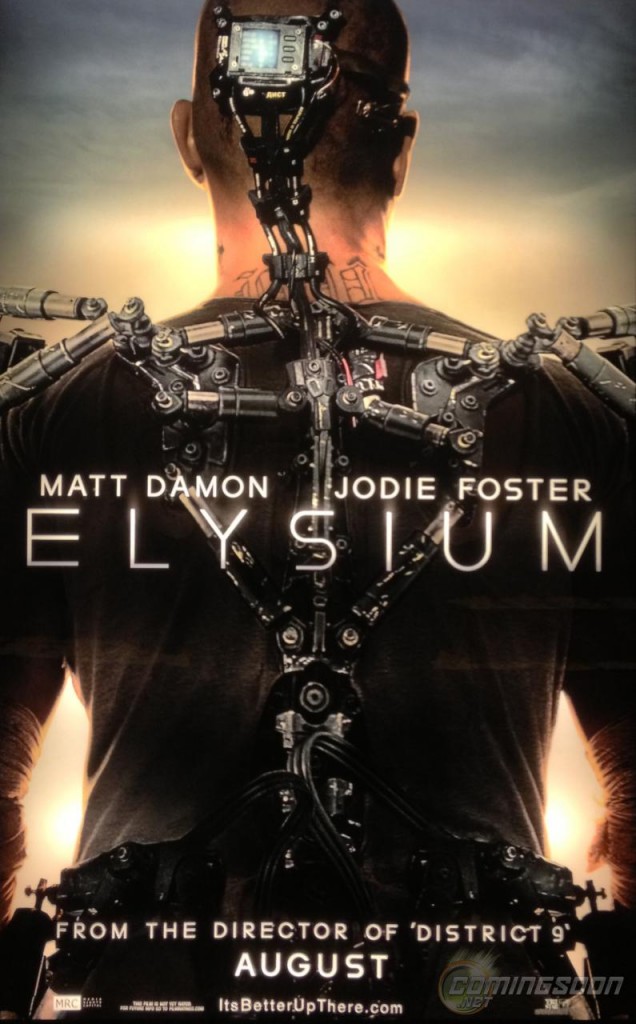Elysium is Energetic, Intense, Pulpy, Violent and Extremely Satisfying on Many Levels, But the Moralizing and Clunky Third Act Short Circuit the Narrative.
Rating: C+
MPAA Rating: R for strong bloody violence and language throughout.
Review by Luke Whitmire
 Plot: In the year 2154, the 99% reside on a dilapidated Earth while the 1% are ensconced in a man-made, celestial sanctuary in space called Elysium, and an ex-convict makes a concerted effort to fight for equality.
Plot: In the year 2154, the 99% reside on a dilapidated Earth while the 1% are ensconced in a man-made, celestial sanctuary in space called Elysium, and an ex-convict makes a concerted effort to fight for equality.
South African-born writer/director Neill Blomkamp, who wrote and directed the 2009 surprise hit District 9—an apartheid parable that reinvigorated the sci-fi genre with interesting new tropes and ideas—formulates another politically-charged allegory with Elysium.
Social class inequality, racism, poverty, immigration and accessible healthcare are important issues that weave the fabric of Elysium, constructed and decorated to give it a patina of political extremes: super-rich oligarchs are evil, proletarians are good and the robust military corporations want to besiege society for nefarious reasons. The protagonists want healthcare, while the antagonists want to keep their Stanford Torus free from illegal immigrants.

Matt Damon in Elysium
Most of the film takes place in Los Angeles, a dystopian society caused by hostile anti-immigration from the wealthy elite that has left millions in catastrophic conditions. Blomkamp structures an intriguing premise, but his message is not the thinking man’s fill-in-the-blank adventure it should have been. A little ambiguity would have elevated this story to greater heights, but the one-sidedness makes it too didactic. I do not mind films that inherit a particular social commentary, but to eviscerate all subtleties can mar the cinematic quality of the film and eliminate your audience, especially when your message is as contentious as “the haves and the have-nots”; and I’m sure the left will praise and the right will assail the film’s plea for universal healthcare, and its strong theme of wealth discrepancy. Some might even think the film promotes Karl Marx’s social conflict theory. Who knows, audiences might see this film more as being about humanity, helping your fellow man, than any partisan politics.
 Matt Damon plays an ex-convict named Max who was raised in a Catholic orphanage and served time in prison for car theft. Without going into plot details, Max is a factory worker and gets radiation sickness; he has only a few days to live and desperation to enter Elysium consumes him. Max knows the elite social class on Elysium can procure the best medical technology, “healing beds” that can cure any kind of disease and mend broken bones in a matter of seconds.
Matt Damon plays an ex-convict named Max who was raised in a Catholic orphanage and served time in prison for car theft. Without going into plot details, Max is a factory worker and gets radiation sickness; he has only a few days to live and desperation to enter Elysium consumes him. Max knows the elite social class on Elysium can procure the best medical technology, “healing beds” that can cure any kind of disease and mend broken bones in a matter of seconds.
When Max makes a concerted effort with a small faction of poor, underground, hard-boiled ex-criminals to take flight to Elysium (orbiting above Earth), the film takes an entertaining, extremely violent, anxiety-inducing turn. In District 9, Blomkamp gave us aliens, and in this film, he gives us raw body augmentations that have to do with the dark side of technology. The leader of the underground motley crew is called Spider (Wagner Moura), and he modifies Max by drilling a metallic exoskeleton into his spine and limbs, equipping him with special abilities to fight, and most importantly, to access the mainframe of Elysium. There are some Robocop and Total Recall moments of gratuitous violence here, and humor so dark I’m shocked it was able to be used. The deft vision that undergirds the narrative, of the increasing pervasiveness of technology, is quite fascinating. Blomkamp really shows us a terrifying future manifested by mechanoids and gadgets.
us raw body augmentations that have to do with the dark side of technology. The leader of the underground motley crew is called Spider (Wagner Moura), and he modifies Max by drilling a metallic exoskeleton into his spine and limbs, equipping him with special abilities to fight, and most importantly, to access the mainframe of Elysium. There are some Robocop and Total Recall moments of gratuitous violence here, and humor so dark I’m shocked it was able to be used. The deft vision that undergirds the narrative, of the increasing pervasiveness of technology, is quite fascinating. Blomkamp really shows us a terrifying future manifested by mechanoids and gadgets.
The aesthetic is the real star of the film, a bleak portrait of a grubby Earth versus the lush, refulgent corridors of Elysium, adding a dynamic contrast that is relatable and believable. Also, the blend of practical effects with digital effects is rendered seamlessly, accentuating the film with a unique, imaginative and visual flair. But perhaps more crucial are the action sequences, devised and executed in daylight, allowing the viewer to see the well-crafted brutality. This is by far the the visually best-looking film of the year.
Another positive about Blomkamp’s beautifully stylized universe is the satirical precision—as seen when Max gets sarcastic with bureaucratic robots that have replaced human workers, and he gets beaten and offered free medication. In this urban wasteland, the system is run by machines, really sticking it to the man. There is an element of effective satire that adds a dark humor to the story.

Jodie Foster in Elysium
Delacourt (Jodie Foster), the Secretary of Defense on Elysium, is not pleased with Max and she unleashes her most skilled agent, the mercenary Kruger (Sharlto Copley from District 9) to go after Max and his technocratic team. When Max and Kruger engage, it becomes a vile slugfest. Copley really stands out as the Blackwater-esque killing machine. As a matter of fact, he is the film’s most engaging character.
Blomkamp crafts a pretty good sociopolitical sci-fi film, and he is very clear in his intentions here. He is making obvious statements about immigration and universal health care, and whether the frequent references bother you or not will greatly influence how much you enjoy the film. Also, the first 45 minutes are utterly fantastic, but the final act is derivative, fragmented and illogical, damaging what was so beautifully crafted and setup in the first and second acts.
Unfortunately, Elysium does not have one once of subtlety, nor does it address anything meaningful about the issues at hand. Instead, Blomkamp devises a black-and-white allegory that has very little character development and a sledgehammer-to-the-head message about class warfare. Again, a little subtlety and ambiguity would have made Elysium a better film.
Bottom line:
Besides the one-sided sociopolitical message, and a third act that falls apart, Elysium is still an entertaining, fun, grim science-fiction tale with an invigorating visual style.